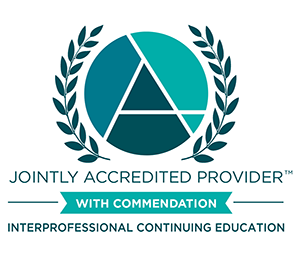- Heather Nieves
Series Overview
The Lung Clinic Conference is a multidisciplinary conference which presents case discussions to evaluate, coordinate, and advance treatments and care of patients with a diagnosis or high suspicion of Lung Cancer. The needs of each patient and plan of care is determined on a case by case basis. The multidisciplinary committee discusses and reviews diagnostic and pathology workup for each case. Current and available treatment options are discussed. A treatment plan then is identified that is specific to each Lung Cancer patient.
Intended Audience
MD/DO, RN, APRN, Physician Assistants, and Pharmacists.
Planning Committee
| Howard Kaufman, DO, Chair | Heather Nieves, MHA, Coordinator | Carly Schutte, RN | Carly Vormeezle, PA |
| Lee Johnson, BSN, Coordinator | Jesseca Pirkle, MD, Resident | Simon Holoubeck, DO | Kara Hoadley, PharmD |
| Melissa Karenke, RN | Korrin Meier, MD |
Accreditation
Accreditation Statement
 | In support of improving patient care, the University of Wisconsin–Madison ICEP is jointly accredited by the Accreditation Council for Continuing Medical Education (ACCME), the Accreditation Council for Pharmacy Education (ACPE), and the American Nurses Credentialing Center (ANCC) to provide continuing education for the healthcare team. |
Credit Designation Statements
American Medical Association (AMA)
The University of Wisconsin–Madison ICEP designates this live activity for a maximum of 1 AMA PRA Category 1 Credit™. Physicians should claim only the credit commensurate with the extent of their participation in the activity.
American Nurses Credentialing Center (ANCC)
The University of Wisconsin–Madison ICEP designates this live activity for a maximum of 1 ANCC contact hour.
AAPA Credit Designation Statement
The University of Wisconsin–Madison ICEP has been authorized by the American Academy of PAs (AAPA) to award AAPA Category 1 CME credit for activities planned in accordance with AAPA CME Criteria. This activity is designated for 1 AAPA Category 1 CME credits. PAs should only claim credit commensurate with the extent of their participation
Continuing Education Units
The University of Wisconsin–Madison ICEP, as a member of the University Professional & Continuing Education Association (UPCEA), authorizes this program for 0.1 continuing education units (CEUs) or 1 hour.
POLICY ON FACULTY AND SPONSOR DISCLOSURE
It is the policy of the University of Wisconsin–Madison Interprofessional Continuing Education Partnership (ICEP) to identify, mitigate and disclose all relevant financial relationships with ineligible companies* held by the speakers/presenters, authors, planners, and other persons who may influence content of this accredited continuing education (CE). In addition, speakers, presenters and authors must disclose any planned discussion of unlabeled/unapproved uses of drugs or devices during their presentation. For this accredited continuing education activity, all relevant financial relationships have been mitigated and detailed disclosures are listed below.
* Ineligible companies are those whose primary business is producing, marketing, selling, re-selling, or distributing healthcare products used by or on patients. The ACCME does not consider providers of clinical service directly to patients to be commercial interests.
Detailed disclosures will be available prior to the start of the activity.
Disclosures for Planning Committee Part 1
Disclosures for Planning Committee Part 2
Competencies
ACGME/NURSING
Practice-Based Learning and Improvement
Systems-Based Practice
INTERPROFESSIONAL EDUCATION COLLABORATIVE COMPETENCIES
Interprofessional Communication
Teams and Teamwork
DIVERSITY, EQUITY, AND INCLUSION COMPETENCIES
Value Diversity in the Clinical Encounter
Additional Activity Goals
| JAC 14 | JAC 20 | JAC 23 |
IP — Competence/Performance
As a result of participation in this educational series, members of the healthcare team will:
- Discuss and review the diagnostic and pathology work up for each case
- Discuss current treatment options available for lung cancer patients including current clinical research protocols
- Identify a treatment plan that is specific to each lung cancer patient, factoring in patient diversity and cultural perspectives
- Increase ability to engage in quality improvement by learning with and from each other through collaborative discussions with the team

 Facebook
Facebook X
X LinkedIn
LinkedIn Forward
Forward